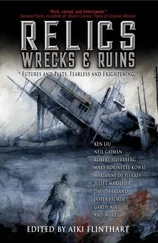—
I spent the next morning wandering the city center, stunned by noise and motion. Auto rickshaws swerved around mangy dogs and women carrying baskets of mangoes on their heads. The bleat of truck horns offered bicyclists a second’s warning to move to the side of the narrow road. Sinhalese soldiers stood on the edge of a field where Tamil boys played cricket, sweating in their leather boots, shifting their rifles from shoulder to shoulder, perking up when the white girl walked past. A pudgy-faced man with thick black curls fell into step alongside me. He asked where I was from, with whom I was traveling, what I thought of Jaffna. His flawless English disarmed me. I answered his questions, asked my own. Dhit worked as a translator for NGOs — when there were any around, he laughed. But he didn’t get to meet many native English speakers. Would I like to come to his home for lunch? His mother and brother would be so happy to meet an American. I hopped on the back of his motorbike.
Dhit’s parents’ small brick house was shuttered and locked, the curtains backlit by the green glow of a TV. Dhit banged on the door, calling out his name. “My mother is afraid of the Tree Demon,” he said, just as she opened the door. He introduced me in Tamil. She wiped flour on her skirt and took my hands. Dhit’s brother clapped his hands and declared his joy to meet an American lady. Was I from Hollywood? Maari was hoping to move there someday and become a famous actor. He was large-eyed, long-limbed, twenty years old. While their mother made pittu — a steamed mash, I learned, of roasted flour and coconut — I asked Dhit and Maari what the Tree Demon was.
Maari stabbed the air with his index finger. “The slavism has come to us!” Dhit glanced through the open door and shushed his brother, but Maari continued speaking with loud insistence. The Tree Demon hid in the branches, waiting to pounce on women drawing well water or children using the outhouse. Some people said he had knives for fingers and metallic armor for skin. Dhit gestured away the horror story, saying the Tree Demon was probably just a normal person who jumped out of trees to scare people. He lowered his voice. “What is certain is that the Tree Demon is protected by the government,” he said.
Maari leaned toward me so that the back legs of his chair raised off the concrete floor. “Yes, of course. There is a sentry point on every corner. How is it that the soldiers do not stop the Tree Demon from entering the villages?”
I looked out the door, trying to calm my uneasy excitement. A hairless dog sat in the road outside their house, picking at fleas. “Could you help me?” I asked Dhit. “I’d like to write about the Tree Demon for an American newspaper. Do you know people I could talk with?”
“Of course, Elsie.” Dhit adjusted the collar of his shirt. He and Maari exchanged grins.
—
So my intention to sit for thirty minutes every morning and evening was quickly overshadowed by my pursuit of a story that was too awful — and too compelling — not to be shared; I worked for a newspaper, after all. I’d meet Dhit outside my guesthouse in the mornings. He’d take me on his motorbike to meet Tamil scholars, reporters, and friends who had heard of Tree Demon attacks. Dhit acted as translator. I tried to pay him, but he turned away from the money, seeming offended. I supposed he wanted to help a foreign journalist—“the international media is our only hope,” I heard from so many people. Then I better not be the international media, I did not say out loud. But after a few days of reporting, I allowed myself to suspend my disbelief about my credentials and capacities. I simply let Dhit help me, taking me from newspaper to local government offices, going back to his house midday for lunch, once pausing to cool off in the ocean, me in my long skirt and kurta, Dhit in his jeans. At times I tried to tell myself to feel these rare moments — watching Maari shimmy up a tree in the backyard to fetch me a coconut; hurtling on Dhit’s motorbike through a field of tall, dry sea grass interrupted by piles of colorful rubbish; drinking tea with reporters who had been beaten up and harassed by the police and yet kept on churning out stories in their one-room office whose only adornment was a life-size cardboard cutout of Gandhi. But I was too intent on my purpose to feel much of anything. All I did was scrawl in my notebook.
By the end of the week, I was constipated from eating nothing but fried starch, on edge from people telling me I should be careful since the security forces were probably following me, exhausted because I was kept awake at night by the sad stories and disturbing images I’d spent the day robotically transcribing, frustrated because victims of Tree Demon attacks kept refusing to be interviewed at the last minute. Yet the self-created urgency of my reporting had convinced me I couldn’t give up. All that frustration and discomfort seemed to indicate that my chaotic notes might add up to something worthwhile.
—
My last night in Jaffna, Dhit took me to a festival at the main temple. The sandy streets leading to the structure’s Gaudí-esque turrets were thronged with worshippers. Women wore heavy gold jewelry, kohl around their eyes, brilliant silk saris. Men in red dhotis clashed cymbals and beat handheld drums. Inside the temple gates, toddlers on their fathers’ shoulders stared wide-eyed at the statue that had been erected for the festival, a two-story-high replica of a god whose long name I couldn’t understand over the noise of the crowd, affixed with hundreds of lightbulbs. The tower of white light began to move, seeming to float through the crowd. I was light-headed with confusion until Dhit pointed out the rope, pulled by dozens of laughing, groaning boys. The tide of the crowd carried us aside to make way for the god, glowing against the red-and-orange sky. With mysterious synchronization, people occasionally raised their hands overhead and cried out, “Haro Hara!” The Tree Demon seemed like a cheesy horror movie playing in the background of a party.
As the first stars appeared, the crowd thinned and Dhit and I made our way back to his bike. On the street, we passed a truck with a makeshift wooden crane attached to the roof. A man in a loincloth hung from the crane, suspended from four thick hooks that pierced the skin of his calves and upper back. Another man stood atop the crane, pulling on a rope attached to the hooks. Somehow there was no blood, but as I watched the tents of skin expand and thin as the hooked man bounced, waving palm fronds, I grew short of breath and had to grip Dhit’s arm and close my eyes. “It’s okay,” he said. “He is in a trance. He feels nothing.” The nausea passed and I released Dhit’s arm. But he stayed close to me, reaching for my hand as we continued walking. I had to pull away with some force.
It was humid and foggy. The thick, gray air was unsettling after the chaos of the temple. I gripped the seat back as Dhit swerved around potholes and stray dogs. We passed a sentry point. A soldier took a few steps into the road as we approached. He stopped and kicked the dirt with his boot. Dhit picked up speed as we passed the neighborhood of bombed-out houses lit by flickering oil lamps. I was leaving Jaffna at five the next morning, to spend my last few days at Rose Land. Shirmani seemed worlds away by now. I wished I had time to go back there before my flight home.
Dhit started to slow down. Shards of silvered light in the middle of the road resolved into stop signs held by soldiers. Dhit eased off the gas. A soldier shined a flashlight in our eyes. His gun jostled against his thigh. This is when it happens, I thought. I felt the hot space between my scalp and the hard dome of my helmet. We were just outside the entrance to my guesthouse. They had been following us. They would punish Dhit for my need to carry a tragic war story back to the States. The soldiers surrounded the bike. The man with the flashlight held out his hand. Dhit reached into his shirt pocket and handed the soldier a small plastic rectangle. The soldier glanced at the ID and gave it back. He stepped away from the bike and waved us through.
Читать дальше












